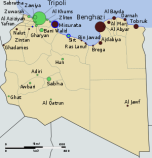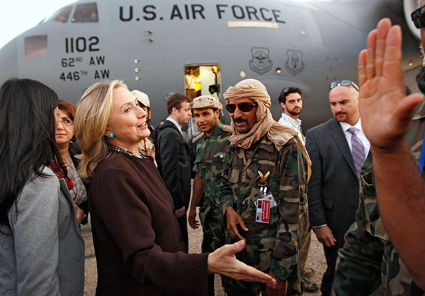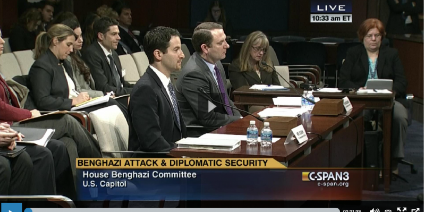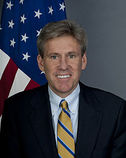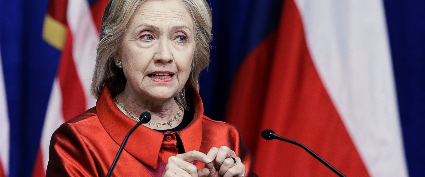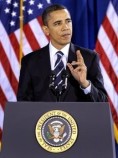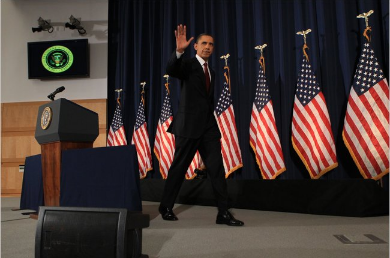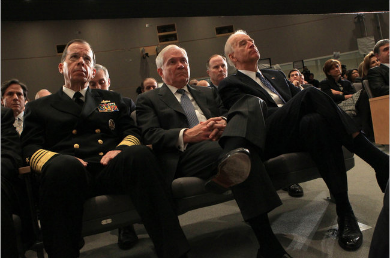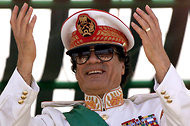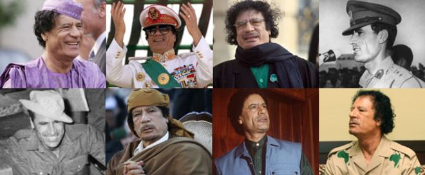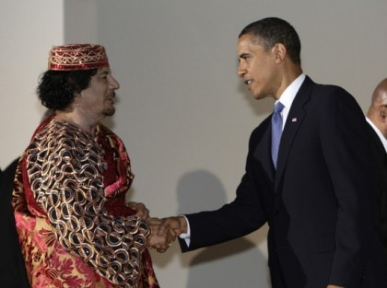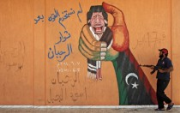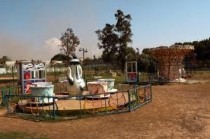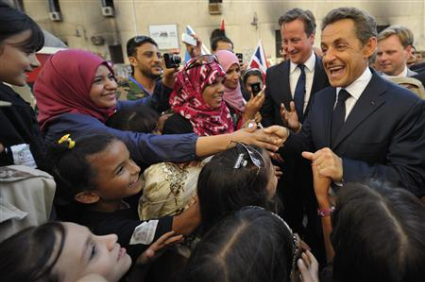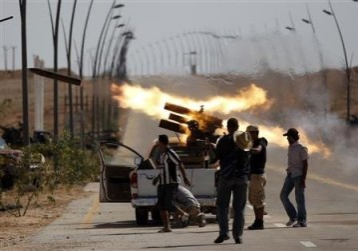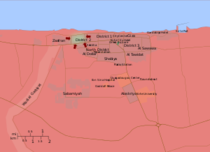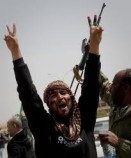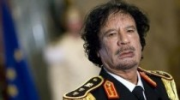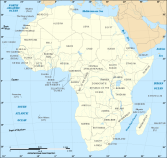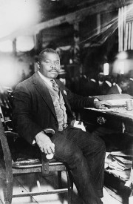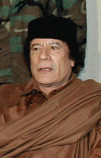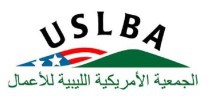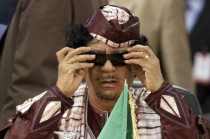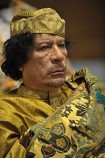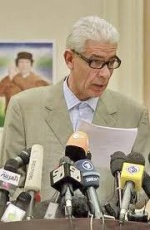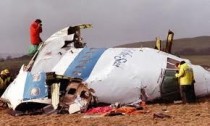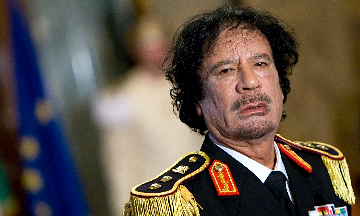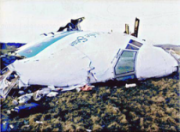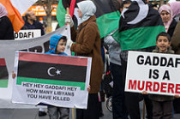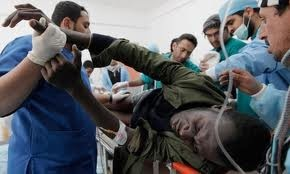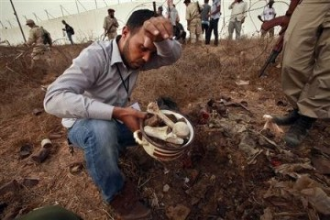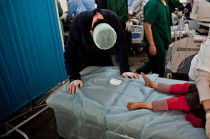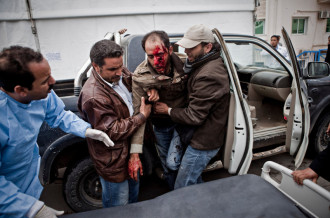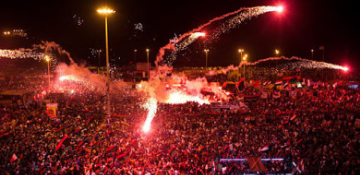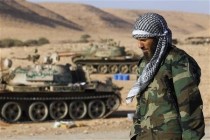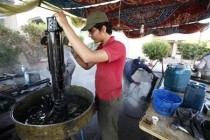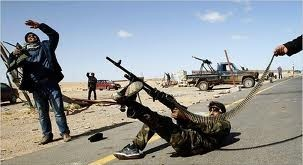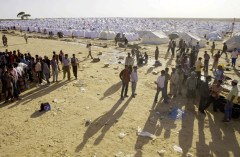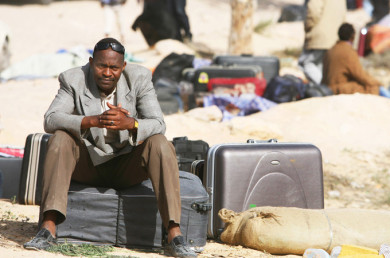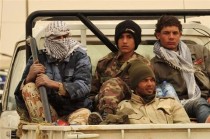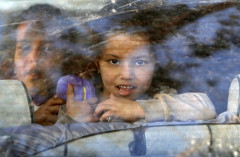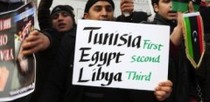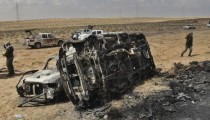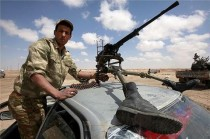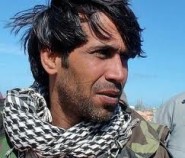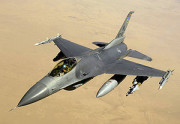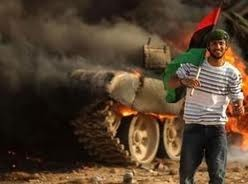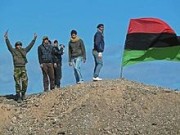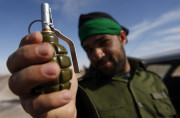Libyan Crisis (2011 - present)
Al Jazeera
More than two years after Muammar Gaddafi was overthrown, chaos reigns in Libya.
The United States has so little trust in the Libyan government that it recently launched a Delta Force raid to apprehend Abu Anas al Libi, an accused al-Qaeda operative who was living openly in Tripoli.
We examine the Delta Force raid and how it may have undermined the Libyan government, which is already struggling to gain control and authority over its country. We also examine human rights abuses committed by the very militias supported by NATO's intervention. In post-revolutionary Libya, Fault Lines finds a nation unraveling. Read more
_____________________________________________________
F.B.I. Director James Comey Recommends No Charges Against Hillary Clinton on Email
F.B.I. Recommends No Charges Against Hillary Clinton for Use of Personal Email
The New York Times
By MARK LANDLER and ERIC LICHTBLAU
JULY 5, 2016
WASHINGTON — The F.B.I. director, James B. Comey, on Tuesday recommended no criminal charges against Hillary Clinton for her handling of classified information while she was secretary of state, lifting an enormous legal cloud from her presidential campaign less than two hours before she boarded Air Force One for her first joint campaign appearance with President Obama.
But on a day of political high drama in Washington, Mr. Comey rebuked Mrs. Clinton as being "extremely careless" in using a private email address and server. He raised questions about her judgment, contradicted statements she has made about her email practices, said it was possible that hostile foreign governments had gained access to her account, and declared that a person still employed by the government — Mrs. Clinton left the State Department in 2013 — could have faced disciplinary action for doing what she did.
To warrant a criminal charge, Mr. Comey said, there had to be evidence that Mrs. Clinton intentionally transmitted or willfully mishandled classified information. The F.B.I. found neither, and as a result, he said, "our judgment is that no reasonable prosecutor would bring such a case."
The Justice Department is highly likely to accept the F.B.I.’s guidance, which a law enforcement official said also cleared three top aides of Mrs. Clinton who were implicated in the case: Jake Sullivan, Huma Abedin and Cheryl D. Mills. Attorney General Loretta Lynch said last week that she would accept the recommendation of the F.B.I. and career prosecutors in the case after a storm of criticism about an impromptu meeting between her and former President Bill Clinton on an airport tarmac in Phoenix. Read more
Libyan Civil War (2014–present)
Wikipedia
The Second Libyan Civil War [53][54] is an ongoing conflict between four rival organizations seeking to control Libya: the internationally recognized government of the Council of Deputies that was elected democratically in 2014, also known as the "Tobruk government" and internationally known formally as the "Libyan Government", which has the loyalty of the Libyan Army under the command of General officer Khalifa Haftar and has been supported by air strikes by Egypt and the UAE.;[55] the rival Islamist government of the General National Congress based in the capital Tripoli, led by the Muslim Brotherhood, backed by the wider Islamist coalition known as "Libya Dawn"[56][57] and aided by Qatar, Sudan, and Turkey;[55][58] the Islamist Shura Council of Benghazi Revolutionaries, led by Ansar al-Sharia (Libya), which has had the support of the General National Congress and the unrecognised government in Tripoli led by former Prime Minister Omar Al-Hassi, stating that Ansar al-Sharia are "simple, beautiful and amiable" as well as being engaged in "missionary work";[59] and the Islamic State of Iraq and the Levant's Libyan provinces [60] Read more
Libyan Civil War (2011)
Wikipedia
The first Libyan Civil War, also referred to as the Libyan Revolution[31] or 17 February Revolution,[32] was an armed conflict in 2011, in the North African country of Libya, fought between forces loyal to Colonel Muammar Gaddafi and those seeking to oust his government.[33][34] The war was preceded by protests in Zawiya on 8 August 2009 and finally ignited by protests in Benghazi beginning on Tuesday, 15 February 2011, which led to clashes with security forces that fired on the crowd.[35] The protests escalated into a rebellion that spread across the country,[36] with the forces opposing Gaddafi establishing an interim governing body, the National Transitional Council.
The United Nations Security Council passed an initial resolution on 26 February, freezing the assets of Gaddafi and his inner circle and restricting their travel, and referred the matter to the International Criminal Court for investigation.[37] In early March, Gaddafi's forces rallied, pushed eastwards and re-took several coastal cities before reaching Benghazi. A further UN resolution authorised member states to establish and enforce a no-fly zone over Libya, and to use "all necessary measures" to prevent attacks on civilians.[38] The Gaddafi government then announced a ceasefire, but fighting continued.[39][40] Throughout the conflict, rebels rejected government offers of a ceasefire and efforts by the African Union to end the fighting because the plans set forth did not include the removal of Gaddafi. Read more
"B. Central Bank of Libya (was) 100% owned by state (since 1956) and is thus outside of multinational corporation control (BIS-Banking International Settlement rules for private interests). The state can finance its own projects and do so without interest rates, which reduce the costs by half of private banks. Libya’s central bank (with three branches in the east including Benghazi) has 144 tons of gold in its vaults, which it could use to start the gold dinar. (China, Russia, India, Iran are stocking great sums of gold rather than relying only on dollars.)" Read more
Exposing the Libyan Agenda: A Closer Look at Hillary Clinton's Emails - Truth-Out, by Ellen Brown
Exposing the Libyan Agenda: A Closer Look at Hillary Clinton's Emails
Truth-Out
By Ellen Brown
The Web of Debt Blog
March 15, 2016
The brief visit of then-Secretary of State Hillary Clinton to Libya in October 2011 was referred to by the media as a "victory lap." "We came, we saw, he died!" she crowed in a CBS video interview on hearing of the capture and brutal murder of Libyan leader Muammar el-Qaddafi.
But the victory lap, write Scott Shane and Jo Becker in The New York Times, was premature. Libya was relegated to the back burner by the State Department, "as the country dissolved into chaos, leading to a civil war that would destabilize the region, fueling the refugee crisis in Europe and allowing the Islamic State to establish a Libyan haven that the United States is now desperately trying to contain."
US-NATO intervention was allegedly undertaken on humanitarian grounds, after reports of mass atrocities; but human rights organizations questioned the claims after finding a lack of evidence. Today, however, verifiable atrocities are occurring. As Dan Kovalik wrote in the Huffington Post, "the human rights situation in Libya is a disaster, as 'thousands of detainees [including children] languish in prisons without proper judicial review,' and 'kidnappings and targeted killings are rampant'."
Before 2011, Libya had achieved economic independence, with its own water, its own food, its own oil, its own money, and its own state-owned bank. It had arisen under Qaddafi from one of the poorest of countries to the richest in Africa. Education and medical treatment were free; having a home was considered a human right; and Libyans participated in an original system of local democracy. The country boasted the world's largest irrigation system, the Great Man-made River project, which brought water from the desert to the cities and coastal areas; and Qaddafi was embarking on a program to spread this model throughout Africa.
But that was before US-NATO forces bombed the irrigation system and wreaked havoc on the country. Today the situation is so dire that President Obama has asked his advisors to draw up options including a new military front in Libya, and the Defense Department is reportedly standing ready with "the full spectrum of military operations required."
The Secretary of State's victory lap was indeed premature, if what we're talking about is the officially stated goal of humanitarian intervention. But her newly-released emails reveal another agenda behind the Libyan war; and this one, it seems, was achieved.
Mission Accomplished?
Of the 3,000 emails released from Hillary Clinton's private email server in late December 2015, about a third were from her close confidante Sidney Blumenthal, the attorney who defended her husband in the Monica Lewinsky case. One of these emails, dated April 2, 2011, reads in part:
Qaddafi's government holds 143 tons of gold, and a similar amount in silver.... This gold was accumulated prior to the current rebellion and was intended to be used to establish a pan-African currency based on the Libyan golden Dinar. This plan was designed to provide the Francophone African Countries with an alternative to the French franc (CFA).
___________________________________________________
_____________________________________________________
Benghazi Committee Reaches Secret, Bickering End
Keeps Costing Money, And Chairman Trey Gowdy is still pondering a perjury investigation of Hillary Clinton
- The Huffington Post, 07/08/2016 04:22 pm ET
by Michael McAuliff, Senior Congressional Reporter
_____________________________________________________
Libya-Progress-Report-Final-1.pdf
Adobe Acrobat document [890.5 KB]
The grand total for paid speeches by Hillary Clinton, and Bill Clinton, since 2001, is $153 million, according to CNN.
____________________________________________________
J. Christopher Stevens
Wikipedia
John Christopher "Chris" Stevens (April 18, 1960 – September 12, 2012) was an American diplomat and lawyer who served as the U.S. Ambassador to Libya from June 2012 to September 12, 2012.[3][4] Stevens was killed when the U.S. consulate in Benghazi, Libya, was attacked by Islamic militants on September 11–12, 2012. Read more
- J. Christopher Stevens - The New York Times
- J. Christopher Stevens - Washington Times
- Remarks by the President on the Deaths of U.S. Embassy Staff in Libya September 12, 2012 The White House
- The Select Committee on Benghazi U.S. Congress
- Interim Progress Report - House Republicans on Sep-11-2012 Benghazi Libya attack PDF
- 2012 Benghazi attack Wikipedia
Timeline: How the Benghazi attacks played out Washington Post
Obama’s statement on Benghazi: ‘Outrageous attack" WashPost
A Deadly Mix in Benghazi The New York Times
40 Minutes In Benghazi Vanity Fair
An eyewitness account of the Benghazi siege Slate.com
- Benghazi was familiar ground for Amb. J. Christopher Stevens Washington Post
- Benghazi siege: The ambassador's last minutes CNN
- Susan Rice 'This Week' Interview: U.S. Ambassador to UN Discusses Muslim Protest (09/2012) YouTube
- Who is Chris Stevens? Ambassador Hillary Clinton Asked To Serve In Benghazi At Heart Of Libya Controversy IBT Article
_____________________________________________________
Tyler Drumheller Was the Man Behind Hillary Clinton's Private Libya Intel, Sources Say - ABC News
Tyler Drumheller Was the Man Behind Hillary Clinton's Private
Libya Intel, Sources Say
ABC News
by BENJAMIN SIEGEL and John Parkinson
Jun 17, 2015, 9:31 PM ET
Former Secretary of State Hillary Clinton had access to the world’s top intelligence agencies and their resources, but at the most turbulent moment of her tenure as the nation’s top diplomat, she received a stream of intelligence on Libya and the Benghazi attack by a former CIA official working outside the government, sources said.
Sidney Blumenthal, a confidant who was paid by the Clinton Foundation, told the Select Committee on Benghazi Tuesday that the information he supplied the sitting Secretary of State came from a "respected former high-ranking CIA official," rankling Republicans charged with investigating the events around the embassy attack.
"We have a CIA, so why would you not rely on your own, vetted, sourced intelligence agency?" Rep. Trey Gowdy (R-SC), the chairman of the House Select Committee on Benghazi, asked reporters Tuesday.
Sources close to the Benghazi investigation identified the official as Tyler Drumheller, a 25-year veteran of the CIA who retired from the agency in 2005 and has since worked in private consulting.
___________________________________________________________
- Remarks by the President on Libya, White House transcript
- PBS NEWSHOUR President Obama’s Remarks on Libya
Obama’s Remarks on Libya
The New York Times
March 28, 2011
Following is a text of President Obama's prepared remarks to the public on the American involvement in the war in Libya, as released by the White House on Monday night:
Good evening. Tonight, I'd like to update the American people on the international effort that we have led in Libya – what we have done, what we plan to do, and why this matters to us.
I want to begin by paying tribute to our men and women in uniform who, once again, have acted with courage, professionalism and patriotism. They have moved with incredible speed and strength. Because
of them and our dedicated diplomats, a coalition has been forged and countless lives have been saved. Meanwhile, as we speak, our troops are supporting our ally Japan, leaving Iraq to its people,
stopping the Taliban's momentum in Afghanistan, and going after al Qaeda around the globe. As Commander-in-Chief, I am grateful to our Soldiers, Sailors, Airmen, Marines, Coast Guardsmen, and their
families, as are all Americans. Read more
Obama’s Remarks on Libya - Text - The Ne[...]
Adobe Acrobat document [67.0 KB]
Obama Cites Limits of U.S. Role in Libya[...]
Adobe Acrobat document [48.7 KB]
Violent End to an Era as Qaddafi Dies in Libya
Violent End to an Era as Qaddafi Dies in Libya
The New York Times
by KAREEM FAHIM, ANTHONY SHADID and RICK GLADSTONE
October 20, 2011
MISURATA, Libya — Col. Muammar el-Qaddafi’s last moments Thursday were as violent as the uprising that overthrew him.
In a cellphone video that went viral on the Internet, the deposed Libyan leader is seen splayed on the hood of a truck and then stumbling amid a frenzied crowd, seemingly
begging for mercy. He is next seen on the ground, with fighters grabbing his hair. Blood pours down his head, drenching his golden brown khakis, as the crowd shouts, "God is great!"
Colonel Qaddafi’s body was shown in later photographs, with bullet holes apparently fired into his head at what forensic experts said was close range, raising the
possibility that he was executed by anti-Qaddafi fighters. Read
more
Muammar Gaddafi killed as Sirte falls
Al Jazeera
October 20, 2011
Muammar Gaddafi has been killed after National Transitional Council fighters overran loyalist defences in Sirte, the toppled Libyan leader's hometown and final
stronghold.
"We have been waiting for this moment for a long time. Muammar Gaddafi has been killed," Mahmoud Jibril, the de facto Libyan prime minister, told reporters on Thursday in
Tripoli, the capital.
Crowds took to the streets of Tripoli and Benghazi, the eastern city that spearheaded the uprising against Gaddafi's 42-year rule in February, to celebrate the news, with
some firing guns and waving Libya's new flag.
Abdul Hakim Belhaj, an NTC military chief, said Gaddafi had died of his wounds after being captured on Thursday. Read more
Our disturbing relationship with Gaddafi Reuters
By Mark Ensalaco
August 23, 2011
The opinions expressed are his own.
Thomas Jefferson once said "rebellion against tyrants is obedience to God."
The Arab Spring is reminding the world that struggles for dignity, freedom, justice and human rights spring from our deepest aspirations as human beings. At the same time
the dictatorial violence in Syria and Libya remind us of the evil that springs from the insatiable will to absolute power.
The repression in Syria has claimed more than 2,200 lives according to the United Nations. Thankfully, the bloodshed is coming to an end in Libya, but it must be
remembered that in Libya, unlike Tunisia and Egypt, it took a bloody civil war and NATO intervention to destroy the decades-long tyranny of Muammar Gaddafi.
Events in Libya compel us to reflect on fundamental moral questions that are larger than geopolitics and the price of petroleum. But it is impossible to reflect on those
moral questions without scrutinizing the compromising attitudes that stem from our acute concerns about national security and access to cheap oil.
In September 2004 the United States lifted economic sanctions leveled against the Gaddafi regime in response to its most egregious act of terror — the destruction of Pan
103 in December 1988. The Bush administration restored full diplomatic relations two years later. It is hard, looking at the bloodshed in Libya today, to reconcile the Bush administration’s
rapprochement with Gaddafi with American values. Read more
The Surreal Ruins of Qaddafi’s Never-Never Land
The New York Times
by ROBERT F. WORTH
September 21, 2011
On the evening of Aug. 23, during the final hours of the battle for Tripoli, a 26-year-old lawyer named Mustafa Abdullah Atiri was lying, exhausted, against the back wall
of a filthy tin-roofed warehouse crammed with 150 prisoners. He had been beaten and tortured every day since Col. Muammar el-Qaddafi’s soldiers arrested him four days earlier. It was just after the
muezzin’s first call to evening prayer — about 10 minutes before 8 — when a pair of guards walked to the door, raised their AK-47 rifles and began spraying the men with bullets. Another guard threw a
grenade into the densely packed crowd. Bodies fell on top of Atiri with the first fusillade, protecting him from the blast. Then the guards opened fire again. Blood began seeping down from the bodies
above, soaking his jeans. As the officers walked back across the yard to reload, a guard named Abdel Razaq, who had shown the men some small mercies over the previous days, went to the door and
shouted at the survivors: "Run! Run!" Read more
RT - Trial of Destruction: Sarkozy sued for Libya crimes
Uploaded on Sep 19, 2011
In Libya, the volatile situation shows no sign of abating - a month after Colonel Gaddafi was ousted. The country's interim leaders are struggling to form a cohesive cabinet - while their forces are still locked in battle with Gaddafi's remaining supporters. The defiant loyalists are making a last stand in three key cities. Sirte, Bani Walid and Sabha have been under heavy assault for over a week, with reports Gaddafi and his sons could be hiding there. Meanwhile, the rest of Libya is reeling from months of civil war, which has left tens of thousands dead. Ongoing NATO airstrikes have also reportedly killed a number of civilians by mistake. But some Western leaders are now facing charges at home over their military intervention. YouTube
Battle of Sirte (2011)
Wikipedia
he Battle of Sirte (also spelled Surt) was the final battle of the Libyan Civil War, beginning when the National Liberation Army attacked the last remnants of the Libyan army still loyal to Muammar Gaddafi in his hometown and designated capital of Sirte, on the Gulf of Sidra. As of September 2011, Sirte and Bani Walid were the last strongholds of Gaddafi loyalists and the NTC hoped that the fall of Sirte would bring the war to an end.[27] The battle and its aftermath marked the final collapse of the four-decade Gaddafi regime.[28] Gaddafi himself was wounded and captured as he attempted to flee the city, and killed in custody less than an hour later. The month-long battle left Sirte almost completely in ruins, with many buildings damaged or totally destroyed.[29] Read more
Libyan rebels in Tripoli's central square
Al Jazeera
August 22, 2011
Euphoric Libyan rebels have moved into the centre of the capital, Tripoli, as Muammar Gaddafi's defenders melted away and thousands of jubilant civilians rushed out of
their homes to cheer the long convoys of pickup trucks packed with fighters shooting in the air.
The rebels' surprising and speedy leap forward, after six months of largely deadlocked civil war, was packed into just a few dramatic hours. By nightfall on Sunday, they
had advanced more than 32km to Tripoli.
Zeina Khodr, Al Jazeera's correspondent, said from the Green Square: "There's a party in the Libyan capital tonight. The people are in charge of the city. They've decided
the square is now called Martyr's Square, the original name. They're shouting 'we're free' and shooting at a poster of Gaddafi." Read more
Price on Gaddafi's head as fighting goes on
Reuters
By Missy Ryan and Ulf Laessing
August 24, 2011
(Reuters) - Libya's new masters offered a million-dollar bounty for the fugitive Muammar Gaddafi on Wednesday, after he urged his men to carry on a battle that kept the
capital in a state of fear.
A day after rebel forces overran his Tripoli headquarters and trashed the symbols of his 42-year dictatorship, rocket and machinegun fire from pockets of loyalists kept
the irregular fighters at bay as they tried to hunt down Gaddafi and his sons.
Western leaders who backed the revolt with NATO air power remained wary of declaring outright victory while the 69-year-old Gaddafi is at large. He issued a rambling but
defiant audio message overnight to remaining bastions of his supporters, some of whom may be tempted to mount an Iraq-style insurgency.
But the international powers and the rebel government-in-waiting in the eastern city of Benghazi lost no time in making arrangements for a handover of Libya's substantial
foreign assets. Funds will be required to bring relief to war-battered towns and to develop oil reserves that can make Libya rich. Read more
Rebels battle Gaddafi loyalists in Tripoli, August 23, 2011
CNN interview with Michael Scheuer, Former CIA Officer
Former CIA officer blows lid off Libya fraud live on CNN
The American Dream
Prison Planet
April 4, 2011
This Is What Happens When Establishment Control Of The Media Cracks For A Moment
Every once in a while, establishment control of the mainstream media cracks for a moment. In an effort to achieve higher ratings, mainstream news programs will invite guests on that promise to be "interesting", but then they will say something that is not part of the script and the entire system will go into a state of chaos for a moment. One example of this happened recently when two CNN "infobabes" interviewed former CIA officer Michael Scheuer about the situation on the ground in Libya. They asked Scheuer some questions regarding the role of the CIA in Libya, but the interview rapidly moved in some directions that the "infobabes" were not anticipating. Instead of sticking to the "Republican" or the "Democrat" script, Scheuer ripped both parties and he detailed many of the reasons why we should have never gone into Libya at all. Read more
Tim Hetherington killed in Libya, Director of "Restrepo"
Tim Hetherington, 40, killed in Libya
Vanity Fair
by David Friend
April 20, 2011
Tim Hetherington, photojournalist, filmmaker, and Vanity Fair contributing photographer, was killed today while covering the conflict in Misrata, Libya. "Tim died about
two hours ago," said Peter N. Bouckaert, of Human Rights Watch, in Geneva, a friend of Hetherington’s. "Three other journalists were also hit [in an] R.P.G. attack, one being Getty photographer Chris
Hondros [who was seriously wounded]; photographer Guy Martin, of the Panos Agency, who is in very serious condition; and a freelancer, Michael Brown, who is slightly wounded."
The U.K.-born, Brooklyn-based Hetherington, 40, who had dual British and American citizenship, was best known for his work in Afghanistan, much of it shot for Vanity
Fair. In 2007, he won the coveted World Press Photo of the Year Award for his coverage of American soldiers in the Korengal Valley—one of four World Press prizes he received. Those assignments in
Afghanistan served as the basis of the 2010 Oscar-nominated documentary Restrepo, which he directed with Vanity Fair contributor (and his longtime journalistic collaborator) Sebastian Junger, author
of The Perfect Storm. The film was recognized for its decidedly apolitical approach to the war. Hetherington also created short films about the G.I.’s he encountered in the Korengal and released a
book of photographs, Infidel, examining the lives of the men of a battle company of the 173rd Airborne. Read more
Why Qaddafi Has Already Lost
By ALI ABDULLATIF AHMIDA
The New York Times
March 16, 2011
THE fight is not over. Whether or not Col. Muammar el-Qaddafi defeats the rebels in eastern Libya, any legitimacy he once had has been extinguished. He has weapons, tanks and planes, but he has lost
the allegiance of even those elements of Libyan society that had once been willing to wait and hope for political reform. His base of support is now only diehard allies and foreign mercenaries. They
might win on the battlefield, but they will lose in the end.
The uprisings in neighboring Tunisia and Egypt were precipitating events, but the resistance has drawn its core motivation from Libya’s brutal experience of colonialism. What is most striking about
the rhetoric of the rebellion is how the anticolonialist theme that Colonel Qaddafi once deployed has now been turned against him and is being used on Twitter and Facebook. Even as they are assaulted
by Colonel Qaddafi’s forces, the rebels have resisted calling for forceful Western intervention, though they support the imposition of a no-flight zone.
Libya’s history explains why. From 1911 to 1943, half a million Libyans died under Italian rule, including 60,000 in concentration camps run by the fascists. Colonel Qaddafi’s nationalist populism is
rooted in the traumas of the colonial era, which were papered over during the modernizing but out-of-touch monarchy that ruled from 1951 to 1969. Read more
United States of Africa
United States of Africa
Wikipedia
The United States of Africa is a proposed concept for a federation of some or all of the 54 sovereign states on the African continent. The concept takes its origin from Marcus Garvey's 1924 poem, Hail, United States of Africa.[1][2][3]
Former Libyan leader Muammar al-Gaddafi, who was the 2009 Chairperson of the African Union (AU), advanced the idea of a United States of Africa at two regional African summits: first in June 2007 in Conakry, Guinea,[4] and again in February 2009 in Addis Ababa, Ethiopia.[5] Gaddafi had previously pushed for its creation at a 2000 summit in Lomé, Togo,[6] having described the AU as a failure on a number of occasions; Gaddafi asserted that only a true pan-African state can provide stability and wealth to Africa. A number of senior AU members also support the proposed federation, believing that it could bring peace to a 'new' Africa.[7] Alpha Oumar Konaré, former President of Mali and former Chairperson of the African Union Commission, spoke in favor of the concept at the commemoration of Africa Day, on May 25, 2006.[8]
Origins
The idea of a multinational unifying African state has been compared to various medieval African empires, including the Ethiopian Empire, the Ghana Empire, the Mali Empire, the Songhai Empire, the Benin Empire, the Kanem Empire, and other historic nation states.[9] During the late 19th and early 20th century the majority of African land was controlled by various European empires, with the British controlling around 30% of the African population at its peak.[10]
The term "United States of Africa" was mentioned first by Marcus Garvey in his poem Hail, United States of Africa[1] in 1924. Garvey's ideas deeply influenced the birth of the Pan-Africanist movement which culminated in 1945 with the Fifth Pan-African Congress in Manchester, United Kingdom, attended by W. E. B. Du Bois, Patrice Lumumba, George Padmore, Jomo Kenyatta, Dudley Thompson, and Kwame Nkrumah.[2] Later, Nkrumah and Haile Selassie took the idea forward to form the 37 nation Organisation of African Unity, the precursor of the African Union.[11]
2009–11 proposals
In February 2009, upon being elected chairman of the 53-nation African Union in Ethiopia, Gaddafi told the assembled African leaders: "I shall continue to insist that our sovereign countries work to achieve the United States of Africa."[12] The BBC reported that Gaddafi had proposed "a single African military force, a single currency and a single passport for Africans to move freely around the continent". Other African leaders stated they would study the proposal's implications, and re-discuss it in May 2009.[5]
The focus for developing the United States of Africa far has been on building subdivisions of Africa - the proposed East African Federation can be seen as an example of this. Former President of Senegal, Abdoulaye Wade, had indicated that the United States of Africa could exist from as early as 2017.[13] The African Union, by contrast, has set itself the task of building a "united and integrated" Africa by 2025.[14] Gaddafi had also indicated that the proposed federation may extend as far west as the Caribbean: Haiti, Jamaica, the Dominican Republic, and other islands featuring a large African diaspora, may be invited to join.[15]
Gaddafi also received criticism for his involvement in the movement, and lack of support for the idea from among other African leaders.[16] A week before Gaddafi's death during the Libyan Civil War, South African President Jacob Zuma expressed relief at the regime's downfall, complaining that Gaddafi had been "intimidating" many African heads of state in an effort to gain influence throughout the continent and suggesting that the African Union will function better without Gaddafi and his repeated proposals for a unitary African government.[17]
After the death of Gaddafi
Gaddafi was ultimately killed during the Battle of Sirte in October 2011. While some regard the project to have died with him, Robert Mugabe has expressed interest in reviving the project. [18]
Libyan Opposition Leaders Slam U.S. Business Lobby’s Deals With Gaddafi
Libyan Opposition Leaders Slam U.S. Business Lobby’s Deals With Gaddafi
Marcus Baram
Huffington Post
February 21, 2011
Some of the biggest oil producers and servicers, including BP, ExxonMobil, Halliburton, Chevron, Conoco and Marathon Oil joined with defense giants like Raytheon and Northrop Grumman, multinationals
like Dow Chemical and Fluor and the high-powered law firm White & Case to form the US-Libya Business Association in 2005. The members of its executive advisory council each pay $20,000 in annual
dues to the group, which is managed by the National Foreign Trade Council, a coalition that seeks to facilitate international opportunities for U.S. companies. Most of the group's members have
lobbied the U.S. government since 2004 to protect their investments in Libya or to iron out business problems with the regime. Bilateral trade with Libya totaled $2.7 billion in 2010, compared to
practically nothing in 2003 when sanctions were still in force. Read
more
The Battle For Libya Is Almost Over... As Is The Battle For Its 144 Tons Of Gold
The Battle For Libya Is Almost Over... As Is The Battle For Its 144 Tons Of Gold
Zero Hedge
by Tyler Durden
August 21, 2011
Following a 6 month stalemate in which neither side had attained any advantage, it suddenly took just a few days for the Libyan rebel forces to steamroll unopposed into
Tripoli. While we are confident that the political aftermath of this outcome will be very much comparable to what is happening in Egypt right now, many wonder why it is that the Libyan situation has
progressed with such speed. Perhaps the answer can be found in the 143.8 tons of gold held by the Libyan Central Bank. Granted it is nowhere near close the 366 tons of gold that Venezuela supposedly
has per the WGC, most of it likely held offshore and not being repatriated, the question of where the global gold cartel may find some of the much needed physical to satisfy Chavez' demands has been
now answered. Of course we assume that said gold has not already departed Libya in direction Caracas over the past 6 months. Which, in retrospect, we probably should, as it would explain why gold is
now at $1875 and rapidly rising. Read more
Libyan Rebels Established A New Central Bank
Libyan Rebels Have Already Established A
New Central Bank Of Libya
The Economic Collapse Blog
by Michael T. Snyder, Esq.
March 29, 2011
The rebels in Libya are in the middle of a life or death civil war and Moammar Gadhafi is still in power and yet somehow the Libyan rebels have had enough time to
establish a new Central Bank of Libya and form a new national oil company. Perhaps when this conflict is over those rebels can become time management consultants. They sure do get a lot done. What a
skilled bunch of rebels - they can fight a war during the day and draw up a new central bank and a new national oil company at night without any outside help whatsoever. If only the rest of us were
so versatile! But isn't forming a central bank something that could be done after the civil war is over? According to Bloomberg, the Transitional National Council has "designated the Central Bank of
Benghazi as a monetary authority competent in monetary policies in Libya and the appointment of a governor to the Central Bank of Libya, with a temporary headquarters in Benghazi." Apparently someone
felt that it was very important to get pesky matters such as control of the banks and control of the money supply out of the way even before a new government is formed. Read more
Libyan Rebels Form Oil Company to Replace Qaddafi’s
Libyan Rebel Council Forms Oil Company to Replace
Qaddafi’s
Bloomberg
by Bill Varner
March 22, 2011
Libyan rebels in Benghazi said they have created a new national oil company to replace the corporation controlled by leader Muammar Qaddafi whose assets were frozen by
the United Nations Security Council.
The Transitional National Council released a statement announcing the decision made at a March 19 meeting to establish the "Libyan Oil Company as supervisory authority on
oil production and policies in the country, based temporarily in Benghazi, and the appointment of an interim director general" of the company.
The Council also said it "designated the Central Bank of Benghazi as a monetary authority competent in monetary policies in Libya and the appointment of a governor to the
Central Bank of Libya, with a temporary headquarters in Benghazi."
The Security Council adopted a resolution on March 17 that froze the foreign assets of the Libyan National Oil Corp. and the Central Bank of Libya, both described in the
text as "a potential source of funding" for Qaddafi’s regime.
Libya holds Africa’s largest oil reserve. Output has fallen to fewer than 400,000 barrels a day, Shokri Ghanem, chairman of the National Oil Corp., said on March 19. The
country produced 1.59 million barrels a day in January, according to estimates compiled by Bloomberg. Exports may be halted for "many months" because of sanctions and unrest, the International Energy
Agency said.
Libya's Post Gadhaffi Future - Who Gets The Oil?
Unseemly Scramble For Libya’s Post-Gaddafi Oil Assets
Underway
Zero Hedge
Guest Post by John Daly
September 5, 2011
While NATO members, led by France, piously proclaimed at the onset of their military offensive in Libya that their concerns were solely humanitarian, a covert tussle to
gain a commanding lead in developing the country’s energy riches in light of Colonel Gaddafi’s departure is well underway.
The Libyan economy depends primarily upon revenues from the oil sector, which contribute about 95 percent of export earnings, 25 percent of GDP, and 80 percent of
government revenue. Prior to the outbreak of conflict, Libya was exporting about 1.3-1.4 million barrels per day from production estimated at roughly 1.79 million barrels per day, of which
approximately 280,000 barrels per day were indigenously consumed. But analysts believe that with reconstruction Libya could soon be exporting 1.6 million barrels per day of high-quality, light
crude. Read more
Libya's Post Gadhaffi Future - Who Gets The Oil?
OilPrice.com
by John Daly
August 24, 2011
Muammar Gadhaffi’s 42 year-old regime is in its death rattle – maybe today, maybe tomorrow, his administration that has ruled Libya with a quixotic and brutal hand is
about to pass, in Trotsky’s piquant phrase, "into the dustbin of history," prompting the question "what next?"
The glittering prize is Libya’s 1.6 million barrels per day output of high quality crude, which accounted for about 2 percent of global oil output drawn from Africa's
largest oil reserves, whose exports have been stymied since the NATO-led campaign began six months ago. Projecting into the future, analysts believe that has reserves to sustain its previous level of
production for 80 years. Read more
Gaddafi asset hunters face legal mazes
Reuters
by Mark Hosenball
October 21, 2011
(Reuters) - Libya's new leaders will have to dig deep to find billions of dollars in cash and assets that Muammar Gaddafi and his family stashed around the world, and
then will face daunting legal hurdles to recover them all, experts said on Friday.
About $19 billion in assets believed to have been under the control of Gaddafi or associates have been located and frozen by the United Nations and member countries, U.S.
officials have said since rebel forces began fighting to oust him from power.
But other estimates suggest Gaddafi controlled as much as $30 billion in assets in the United States alone, plus large holdings in Europe and South Africa, said Victor
Comras, a former money laundering expert for the United Nations and U.S. State Department. Read more
On Libya’s Revolutionary Road
The New York Times
by ROBERT F. WORTH
March 30, 2011
On the evening of Feb. 8, Khalid Saih found himself in the back of a speeding car on the outskirts of Tripoli. It was not by choice. Saih, a lanky 36-year-old lawyer, was part of a small group of
Libyan activists who were openly calling for a new constitution and more civil rights. After months of harassment by the police, he and three fellow lawyers were ordered to report to the Interior
Ministry in Tripoli. From there, with no warning, they were bundled into a car and told they would be meeting the Leader.
The men were terrified. None had met Col. Muammar el-Qaddafi before. All of them had friends or relatives who had been tortured or murdered in his prisons. As they rode, they made contact with
friends back in their hometown, Benghazi, to report their location, in case they were imprisoned or killed. To calm their nerves, they recited a prayer that is invoked in situations of great
danger:
God is great,
God the dearest of all Creation,
God is greater than what I fear,
I take refuge in God,
There is no protection but he from the evil servant and his soldiers,
God be my protector from the bulk of their evil.
After a half-hour they arrived at a gated compound with a sign marked in Arabic "Equestrian Club of Abu Sitteh." There were uniformed guards with guns and layers of barbed wire. The car stopped, and
a man took the lawyers’ cellphones and escorted them to a large Bedouin-style tent, illuminated by an enormous bonfire in front. They went in and sat down at a long, dimly lighted table. An attendant
brought them glasses of fresh camel’s milk. Then Qaddafi entered, wearing brown Bedouin robes and a fur hat with flaps hanging down the sides. With him were two of his top security aides, Abdullah
al-Sanousi and Ahmed Qaddaf al-Dam, both well-known and feared men. The Leader shook the lawyers’ hands and joined them at the head of the table. Read more
'No immunity' for Libyan foreign minister
Al Jazeera
March 31, 2011
UK foreign minister says Moussa Koussa, once Gaddafi's spy chief, is "distressed and dissatisfied" by events in Libya.
Moussa Koussa, the former Libyan foreign minister who resigned his position and fled to the UK, has not been offered immunity from prosecution and is "voluntarily talking" to authorities, William
Hague, Britain's foreign minister, has said.
Koussa was staying in a safe and secure place and engaged in ongoing discussions with British diplomats, including some who worked at the now-shuttered embassy in Libya, Hague said. "His [Koussa's]
resignation shows that [Muammar] Gaddafi's regime ... is fragmented, under pressure and crumbling from within," he said.
Hague said Koussa had been his contact with the regime in recent weeks and that he had spoken with him several times. "One thing I gathered between the lines of my telephone calls ... was that he was
very distressed and dissatisfied" by the regime's response to protests, Hague said.
A Libyan government spokesman confirmed on Thursday that Koussa had resigned but said that Gaddafi still enjoyed the support of his people. Moussa Ibrahim said that Koussa's decision was personal and
"other people will step in and do the job".
Ibrahim says Koussa had been given permission to go to Tunisia because he was sick with diabetes and high blood pressure. He said the goverment did not know he would go to London.
On Thursday, a second top official said he would not serve in Gaddfai's regime. Ali Abdessalam Treki, a former foreign minister and UN general assembly president, had been named to epresent Libya at
the UN after a wave of defections early in the uprising. Treki, who is currently in Cairo, said in a statement posted on several opposition websites that he was not going to accept that job or any
other. "We should not let our country fall into an unknown fate," he said. "It is our nation's right to live in freedom, democracy and a good life."
Lockerbie questions
Scottish authorities said on Thursday that they wished to interview Koussa over the 1988 Lockerbie bombing. "We have notified the Foreign and Commonwealth Office that the Scottish prosecuting and
investigating authorities wish to interview Mr Koussa in connection with the Lockerbie bombing," Scotland's crown office said in a statement. "The investigation into the Lockerbie bombing remains
open and we will pursue all relevant lines of inquiry."
The bombing over the Scottish town in 1988 killed 259 people, mostly Americans, on the plane and 11 on the ground.
Last month, Mustafa Abdel Jalil, the former Libyan justice minister and leader of the rebel's interim national council, said that Gaddafi ordered intelligence officers, including the convicted bomber
Abdel Baset al Megrahi, to carry out the bombing.
Jim Swire, whose daughter Flora was among those killed, said Koussa's arrival in Britain was an opportunity to finally shed some light on the bombing. "Koussa was at the centre of Gaddafi's inner
circle. This is a guy who knows everything," he said. "I think this is a fantastic day for those who seek the truth about Lockerbie. He could tell us everything the Gaddafi regime knows." Al Jazeera
Remember Gaddafi the terrorist? Was he a terrorist?
Pan Am Flight 103
Wikipedia
Pan Am Flight 103 was a regularly scheduled Pan Am transatlantic flight from Frankfurt to Detroit, via London and New York. On 21 December 1988, N739PA, the aircraft operating the transatlantic leg of the route, was destroyed by a terrorist bomb, killing all 243 passengers and 16 crew, in what became known as the Lockerbie bombing.[3] Large sections of the aircraft crashed onto residential areas of Lockerbie, Scotland, killing 11 more people on the ground.
Following a three-year joint investigation by Dumfries and Galloway Constabulary and the US Federal Bureau of Investigation (FBI), arrest warrants were issued for two Libyan nationals in November 1991. In 1999, Libyan leader Colonel Muammar Gaddafi handed over the two men for trial at Camp Zeist, Netherlands after protracted negotiations and UN sanctions. In 2001, Libyan intelligence officer Abdelbaset al-Megrahi was jailed for life after being found guilty of 270 counts of murder in connection with the bombing. In August 2009, he was released by the Scottish Government on compassionate grounds after being diagnosed with prostate cancer. He died in May 2012, the only person to be convicted for the attack. He had continually asserted his innocence.
In 2003, Gaddafi accepted responsibility for the Lockerbie bombing and paid compensation to the families of the victims, although he maintained that he had never given the order for the attack.[4] During the Libyan Civil War in 2011, a former government official claimed that the Libyan leader had personally ordered the bombing.[4] Read more
From Libya
On 29 May 2002, Libya offered up to US$2.7 billion to settle claims by the families of the 270 killed in the Lockerbie bombing, representing US$10 million per family. The Libyan offer was that 40% of the money would be released when United Nations sanctions, suspended in 1999, were cancelled; another 40% when US trade sanctions were lifted; and the final 20% when the US State Department removed Libya from its list of states sponsoring terrorism.
Jim Kreindler of the New York law firm Kreindler & Kreindler, which orchestrated the settlement, said:
"These are uncharted waters. It is the first time that any of the states designated as sponsors of terrorism have offered compensation to families of terror victims."
The US State Department maintained that it was not directly involved. "Some families want cash, others say it is blood money," said a State Department official.
Compensation for the families of the PA103 victims was among the steps set by the UN for lifting its sanctions against Libya. Other requirements included a formal denunciation of terrorism—which Libya said it had already made—and "accepting responsibility for the actions of its officials".[137][138]
On 15 August 2003, Libya's UN ambassador, Ahmed Own, submitted a letter to the UN Security Council formally accepting "responsibility for the actions of its officials" in relation to the Lockerbie bombing.[139] The Libyan government then proceeded to pay compensation to each family of US$8 million (from which legal fees of about US$2.5 million were deducted) and, as a result, the UN cancelled the sanctions that had been suspended four years earlier, and US trade sanctions were lifted. A further US$2 million would have gone to each family had the US State Department removed Libya from its list of states regarded as supporting international terrorism, but as this did not happen by the deadline set by Libya, the Libyan Central Bank withdrew the remaining US$540 million in April 2005 from the escrow account in Switzerland through which the earlier US$2.16 billion compensation for the victims' families had been paid.[140] The United States announced resumption of full diplomatic relations with Libya after deciding to remove it from its list of countries that support terrorism on 15 May 2006.[141] Read more
Casualties of the 2011 Libyan Civil War
A man collects human remains at site of a mass grave
In a Medical Tent in Libya, a Grim Procession
In a Medical Tent in Libya, a Grim Procession
The New York Times
by C.J. Chivers
April 17, 2011
MISURATA, Libya — Jinan Hussein Jweil rested on her back on a gurney inside the triage tent. Either a bullet or a piece of whizzing shrapnel had struck the 5-year-old
high on the right side of her head. A Libyan and Italian medical team worked to save her. It was not certain they could. "Her brain is out," said Dr. Abdullah Juwid, a surgeon.
As the ugly math of a midsize city suffering a siege would have it, Dr. Juwid was both a doctor in an overcrowded triage tent and an uncle of this wounded child. He had
no time to dwell on her case. A pickup truck skidded to a stop outside. Several rebel fighters carried their bullet-riddled friend through the entrance flap. The man appeared to have been in his 20s.
He had been shot through both legs and squarely in his chest and mouth. His pupils were fixed. "Maybe he is dead," another doctor said, as their assistants cut away the man’s clothes. The assistants
stopped. There was no point in searching for more wounds. "He is killed," one of them said. Read
more
A Procession of Wartime Trauma, New York Times Photo Journal
Al Jazeera's Hoda Abdel-Hamid spent some time driving around the eastern front in Libya with Hatem Al Hodairy, a volunteer ambulance driver.
Libyan tanks strike Sirte loyalists Reuters
By Alexander Dziadosz
and Sherine El Madany
September 26, 2011
SIRTE (Reuters) - Tanks manned by fighters for Libya's interim government shelled loyalists holding out in Muammar Gaddafi's hometown on Monday as NATO jets circled
overhead, ready to renew air strikes on the besieged coastal city of Sirte.
While anti-Gaddafi forces which have advanced from the west held their ground, firing from two tanks positioned about 2 km (2,000 yards) from the center of the sprawling
desert town, a sharp push forward on the eastern front by scores of armed pick-up trucks raised spirits among the attackers.
Sirte, where NATO aircraft hit targets on Sunday, lies between Tripoli and the eastern city of Benghazi, both now held by the National Transitional Council (NTC), whose
rebel fighters overran the capital five weeks ago after six months of fighting.
Taking Sirte would be a huge boost for the NTC as it tries to establish credibility as a government able to unite Libya's fractious tribes and regions, and a blow for
Gaddafi, widely believed to be in hiding somewhere in Libya. Read more
Volunteers keep rebellion against Gaddafi alive
Reuters
By Sherine El Madany
June 9, 2011
BENGHAZI, Libya
As the war against Muammar Gaddafi drags on, rebel stocks of food and functioning weapons are dwindling and an army of volunteers has emerged to keep the campaign
afloat.
Restaurant staff cook around the clock to provide free meals for the front line. Teachers, schoolchildren and doctors have put on greasy overalls to repair and maintain
rebel weaponry.
"We work with one goal in mind -- to end Gaddafi's rule as soon as possible, even with just a twist of a spanner," said Gadallah el-Kadiky, 43, who dropped his job as a
truck driver after the uprising against Gaddafi began in February.
Kadiky and his two teenage sons spend 12 hours each day at an arms depot on the edge of insurgent-held Benghazi repairing rebel vehicles damaged in skirmishes with
Gaddafi troops in the desert expanses further west.
The boys hand him spanners and wrenches as he works to fix as many as five of the vehicles per day. Trained mechanics in blue overalls offer words of advice.
Around 100 volunteers at the depot strip down weapons, most of them the spoils of battle, repair and clean them for new service or recycle spare parts to make new
guns.
They work fast under a hot sun, stepping gingerly among piles of metal, screwdrivers, bolts and wrenches scattered on the ground. Many wear name tags bearing the caption
"Grandchildren of Omar al-Mukhtar," the hero of Libyan resistance against Italian colonizers. Read more
Migrants forced to fight for Gaddafi Al
Jazeera
by Anna Branthwaite
April 9, 2011
'They said we must stay to fight when the Americans come,' a Ghanaian worker tells Al Jazeera from a refugee camp.
Among the reports of atrocities occurring in Libya are claims from African migrants that they were abducted and forced to fight with Gaddafi's forces.
Nearly all migrants from sub-Saharan Africa, who arrive at the desert refugee camp in Tunisia, have fled in fear of violent reprisals by Libyans who accuse them of being
mercenaries. The extent to which Gaddafi's military has used foreign mercenaries, or press-ganged migrants into fighting, remains unclear.
A former Nigerian police officer, who had worked in Libya for eight years as a technician, alleges he was abducted in mid-March at a military checkpoint in Tripoli, along
with other men from Ghana, Mali and Niger, before being taken to a military centre.
"There was up to 100 people in the courtyard and military trucks were arriving and leaving with more people. They started beating people, I saw them shoot one Ghanaian in
front of me. The atmosphere was very intimidating," he explained. "They put us into a vehicle and we were driven into the desert. I saw an oil refinery, there was evidence of bomb strikes, burnt out
vehicles and a strong smell. I think it was Ras Lanouf."
A Ghanaian worker claimed to have been abducted by Libyan military when they stormed his house in Sirte.
"They asked us why we were trying to leave the country and that we must stay to fight for when the Americans come," he explained. "We were taken to a police station and
then to an underground hospital which they ordered us to clean." Read more
NATO admits deadly airstrike but blames Libyan rebels
NATO admits deadly airstrike but blames Libyan rebels
McClatchy Newspapers
By Shashank Bengali
April 8, 2011
BENGHAZI, Libya — The deputy commander of NATO forces in Libya acknowledged Friday that the alliance struck rebel tanks outside the eastern oil town of Brega a day earlier but blamed the deadly
incident on a lack of communication from the rebels.
Rear Adm. Russell Harding said "it would appear that two of our strikes yesterday may have resulted in the deaths of a number of TNC forces," referring to the Transitional National Council, the
rebels' de facto government. Doctors said that at least five people were killed in the Thursday morning strike, the second friendly fire incident in less than a week involving NATO forces and the
rebels battling Libyan strongman Muammar Gadhafi. Read more
Libyan rebels and residents flee Ajdabiya
Al Jazeera
April 8, 2011
Groups of Libyan rebels and civilians have fled from the eastern town of Ajdabiya after a rebel armoured unit was hit by apparent NATO air strikes, allowing government troops to advance.
Families packed into cars and lorries on Thursday and joined rebel military vehicles in a convoy heading northeast towards the de facto opposition capital of Benghazi, around 160km away.
Libyan state television claimed that forces loyal to longtime leader Muammar Gaddafi had entered Ajdabiya, but residents said they could see no sign of them.
The retreat began soon after rebel tanks were hit by an air strike around midday near the key oil town of Brega, 80km west of Ajdabiya. Many rebel fighters remained in the town along with doctors at
the hospital, after its patients were evacuated to Benghazi as a precaution, Ajdabiya Hospital administrator Majbali Yunis said.
Another hospital official, Mohamed Idris, said at least five people were killed and 22 injured in the strike, including some with serious burns.
Al Jazeera's Laurence Lee, reporting from Benghazi, said that after the initial assumption that it must have been a friendly fire incident, a separate story had emerged that maybe it was not a NATO
strike.
"Maybe it was a light plane, presumably hired by Gaddafi's forces, which hit the tanks," he said.
"Whichever way you look at it, it's not very good for the rebels. Clearly if it was NATO, that demonstrates once again the enormous rift in communication between the rebels and NATO. If NATO says
'no, it wasn't us,' then you can only assume that Gaddafi is getting weaponry and indeed light aircraft from abroad. Read more
The roots of indecision: Obama and Libya
Al Jazeera
by Russell A. Berman
April 7, 2011
The Obama administration has yet to find its footing amidst the political tremblings across the Middle East. And Washington's reactions have been inconsistent.
When the Green Movement called for democracy in Iran, Obama signaled to the Tehran leadership that he would stand aloof.
Yet when long-standing American ally Hosni Mubarak of Egypt faced demonstrations, Obama quickly called for him to resign. Servility toward enemies and abandonment of friends seems to be the watchword
for American foreign policy: except of course with that old friend Saudi Arabia, whose invasion of Bahrain evoked no US protests.
Most egregiously, Obama delayed any decision regarding Libya until Gaddafi was on the verge of crushing his opponents. Confusion as far as the eye can see.
No wonder. Washington lacks much ability to grasp these political dynamics, in part because of the systematic degradation of intelligence capabilities that has been underway in the US since the
post-Vietnam era.
One can genuinely take the US government at its word when it proclaims that it has very little insight into the identity of the Libyan rebels. The term "clueless" comes to mind. Read more
Nato 'friendly fire' strike kills 13 rebels and wounds seven
but air support must continue against defiant Gaddafi
DailyMail, Mail Online
by Richard Hartley-Parkinson
April 3, 2011
A Nato-led air strike has killed 13 Libyan rebels in a 'regrettable incident' last night, according to a rebel spokesman.
In an increasingly chaotic battle with Muammar Gaddafi's forces over the oil town of Brega, the air strike is said to have hit several vehicles carrying rebel fighters on
Friday night.
Yet, despite the deaths on Friday night, the rebel leadership called for continued air strikes against Gaddafi's forces, which have reversed a rebel advance on the
coastal road linking their eastern stronghold with western Libya.
At least four burnt-out vehicles, including an ambulance, could be seen at the strike site near the eastern entrance to the town. Read more
Gaddafi's forces battle rebels for Brega
Al Jazeera
March 31, 2011
NATO to investigate reports that at least 40 civilians have been killed in air strikes over Tripoli.
Troops loyal to Muammar Gaddafi have continued their advance against pro-democracy fighters as they moved eastwards toward Brega.
Brega is one of several oil towns along the fiercely contested coastal strip. Ras Lanuf and Es Sider, west of Brega, have both been retaken by Gaddafi's forces. Zueitina, east of Brega, is still in
rebel hands.
Some rebel forces fell back on Wednesday as far as the town of Ajdabiya, the gateway to the east about 150 kilometres south of the rebel stronghold of Benghazi. Ajdabiya was still in rebel hands on
Thursday.
For several weeks pro-democracy fighters and forces loyal to Gaddafi have been fighting across a strip of land between Ajdabiya and Bin Jawad.
Rebels armed mainly with pick-ups mounted with machine guns, rocket-propelled grenade launchers and AK-47 assault rifles have been unable to hold on to gains despite almost two weeks of air strikes
by coalition forces.
Brega and Misurata reportedly came under heavy attack from Gaddafi's forces on Thursday, with the frontline moving closer to Ajdabiya.
Misurata – the last major rebel stronghold in western Libya – has been encircled by pro-Gaddafi forces for weeks and repeated coalition air strikes aimed at protecting civilians there have not
stopped them. Al Jazeera
Washington in Fierce Debate on Arming Libyan Rebels
Washington in Fierce Debate on Arming Libyan Rebels
The New York Times
By Mark Landler, Elizabeth Bumiller and Steven Lee Myers
March 29, 2011
WASHINGTON — The Obama administration is engaged in a fierce debate over whether to supply weapons to the rebels in Libya, senior officials said on Tuesday, with some fearful that providing arms
would deepen American involvement in a civil war and that some fighters may have links to Al Qaeda.
The debate has drawn in the White House, the State Department and the Pentagon, these officials said, and has prompted an urgent call for intelligence about a ragtag band of rebels who are waging a
town-by-town battle against Col. Muammar el-Qaddafi, from a base in eastern Libya long suspected of supplying terrorist recruits.
"Al Qaeda in that part of the country is obviously an issue," a senior official said.
On a day when Libyan forces counterattacked, fears about the rebels surfaced publicly on Capitol Hill on Tuesday when the military commander of NATO, Adm. James G. Stavridis, told a Senate hearing
that there were "flickers" in intelligence reports about the presence of Qaeda and Hezbollah members among the anti-Qaddafi forces. No full picture of the opposition has emerged, Admiral Stavridis
said. While eastern Libya was the center of Islamist protests in the late 1990s, it is unclear how many groups retain ties to Al Qaeda.
The French government, which has led the international charge against Colonel Qaddafi, has placed mounting pressure on the United States to provide greater assistance to the rebels. The question of
how best to support the opposition dominated an international conference about Libya on Tuesday in London.
While Secretary of State Hillary Rodham Clinton said the administration had not yet decided whether to actually transfer arms, she reiterated that the United States had a right to do so, despite an
arms embargo on Libya, because of the United Nations Security Council’s broad resolution authorizing military action to protect civilians.
In a reflection of the seriousness of the administration’s debate, Mr. Obama said Tuesday that he was keeping his options open on arming the rebels. "I’m not ruling it out, but I’m also not ruling it
in," Mr. Obama told NBC News. "We’re still making an assessment partly about what Qaddafi’s forces are going to be doing. Keep in mind, we’ve been at this now for nine days." Read more
U.S. Missiles Strike Libyan Air Defense Targets
U.S. Missiles Strike Libyan Air Defense Targets
The New York Times
By STEVEN ERLANGER and
DAVID D. KIRKPATRICK
March 19, 2011
PARIS — American and European forces began a broad campaign of strikes against the government of Col. Muammar el-Qaddafi on Saturday, unleashing warplanes and missiles in the first round of the
largest international military intervention in the Arab world since the invasion of Iraq, the Pentagon said.
Pentagon and NATO officials detailed a mission designed to impose a United Nations-sanctioned no-fly zone and keep Mr. Qaddafi from using airpower against beleaguered rebel forces in the east. While
the overall effort was portrayed as mostly being led by France and Britain, the Pentagon said that American forces dominated an effort to knock out Libya’s air-defense systems.
In a briefing Saturday afternoon, Vice Adm. William Gortney told reporters that about 110 Tomahawk missiles, fired from American warships and submarines and one British submarine struck 20
air-defense targets around Tripoli, the capital, and the western city of Misurata. He said the strikes were against longer-range air defense missiles as well as early warning radar sites and main
command-and-control communication centers. Read more
Libyan rebels lose last stronghold west of Tripoli
By RYAN LUCAS and DIAA HADID
Associated Press
March 15, 2011
TOBRUK, Libya – Moammar Gadhafi's forces overwhelmed rebels in a strategic eastern city, hammering them with airstrikes, missiles, tanks and artillery Tuesday in an assault that sent residents
fleeing and threatened to open the way for an all-out government offensive on the opposition's main stronghold in the east, Benghazi.
In desperation, rebels sent up two antiquated warplanes that struck a government ship bombarding Ajdabiya from the Mediterranean. But as tanks rolled into the city from two
directions and rockets relentlessly pounded houses and shops, the ragtag opposition fighters' defenses appeared to break down. Some lashed out at the West for failing to come to their aid with a
no-fly zone.
"This is a mad man, a butcher," one rebel fighter said of Gadhafi, speaking to The Associated Press by telephone as explosions were heard in the background. "It's indiscriminate fire."
"The world is sleeping," he said. "They (the West) drunk of Gadhafi's oil and now they won't stand against him. They didn't give us a no-fly zone." Read more
Libya's rebels try to organize better, but it's not easy
McClatchy Newspapers
By Nancy A. Youssef
March 12, 2011
AJDABIYA, Libya — As the conflict for control of Libya appears to be turning into a protracted war, the motley rebel forces that once charged forward easily to take parts of the east said Saturday
that they now must organize themselves better militarily.
Here at the large green arches that mark this city's boundaries, where hundreds of rebel fighters once gathered jubilantly to march of to war, some not even carrying weapons, few remain. It's become
too dangerous, the remaining rebels say. A few tanks remain, and only a few fighters patrol this entryway to the city.
Rebels said they now have commanders operating out of the newly named military operations center in Benghazi, the capital in the liberated east. Those commanders of the east's rebel Army join them at
the front as well, fighters said, often wearing the rank of colonel on procured uniforms they didn't own a few days ago.
The rebels now even have food and water supply lines running from liberated towns to the ones up for control, sometimes with food prepared by wives left behind at home, so they now can stay and fight
for days at a time.
The fighters also have developed their own rotation schedule so they can go home and rest. Many fighters have fought in every town won, moving along the barren highway that connects the cities.
Indeed, they are starting to recognize each other and their doctors who travel with them between battlefields. Read more




